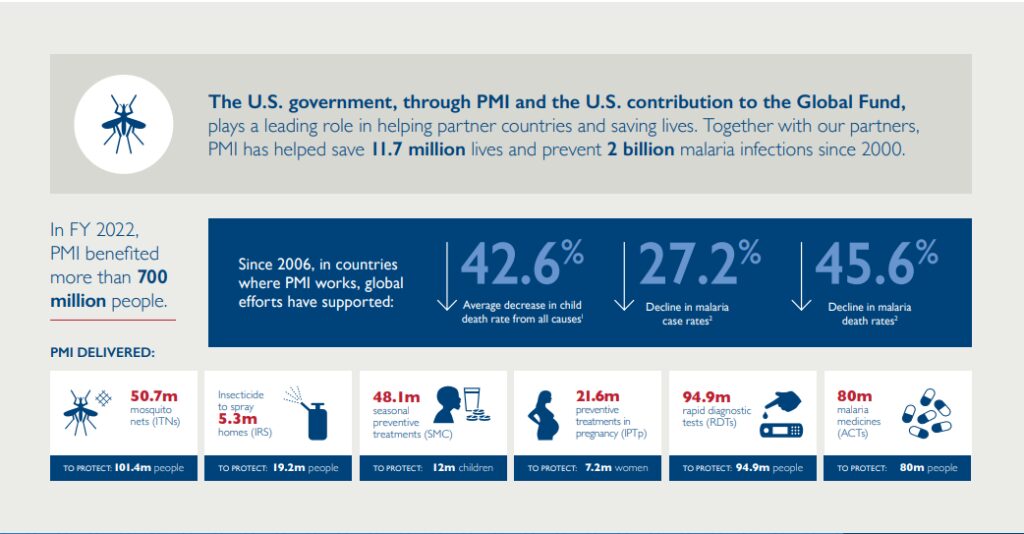This piece originally ran on the Impact Malaria blog.
World Malaria Day is a time to recommit to progress towards reaching the last mile goal of ending malaria. In 2022, USAID committed $746million through the U.S. President’s Malaria Initiative (PMI) to that goal which benefitted more than 700 million people. As PMI’s flagship global service delivery project, PMI Impact Malaria owes our continued impact to the generosity of the American people and Congressional support, whose sustained investments in USAID’s PMI align with this year’s World Malaria Day theme: Time to deliver zero malaria: invest, innovate, implement.
To reach the unreached with lifesaving malaria services, PMI Impact Malaria supports 18 partner countries and their national malaria programs to meet their strategic goals and advance their efforts to control and eliminate malaria. We support investments in essential health workers, developing innovative approaches, and implementing quality improvement tools to end malaria.

Invest
PMI Impact Malaria is committed to investing in local leadership to strengthen Ministries of Health in the countries where we work to better deliver on their commitment towards zero malaria. These investments support health workers like Founèba Traoré in Mali, who is her community’s lifeline providing essential health services that close the gap in quality care. By investing in local leadership and health workers like Founèba, national governments can deliver services, tools, and medicine to where they are needed most and build resilient, accessible health systems.
Innovate
Despite global funding setbacks and health system disruptions from the pandemic, national malaria programs continue to innovate strategies that adapt to health crises. To support them, PMI Impact Malaria works with country teams to help develop and deliver these innovations to achieve sustainable health outcomes. In the Greater Mekong Subregion, we support an innovative surveillance approach that combats antimalarial resistance and meets regional elimination goals. In Burkina Faso, Cameroon, Mali, and Niger, we continue to support adaptations to seasonal malaria chemoprevention campaigns to reach millions of children each year. These are among many efforts that create safer environments and help health systems stay ahead of global challenges.
Implement
Finally, national governments continue to lead by implementing tools that improve the quality of malaria service delivery. PMI Impact Malaria supports the implementation of quality improvement efforts through Outreach, Training and Supportive Supervision Plus (OTSS+). This supportive, on-the-job training for health workers catalyzes the already effective efforts of regional governments and community health facilities by integrating technology, tools, and data. Implementing OTSS+ allows facilities to track progress, make data-informed decisions, and improve skills over time so they can provide the highest quality of care to their patients.
Aligning this year’s theme – invest, innovate, implement – PMI Impact Malaria remains committed to supporting country leadership, national malaria programs, and health systems through their strategies to achieve their goals of reaching the unreached and ending malaria. As we mark World Malaria Day 2023, we applaud the efforts of endemic countries and the essential frontline health workers like Founèba who will make “zero malaria” a reality.
Respectfully,
Ricki Orford
Project Director, PMI Impact Malaria
Cover photo caption: Community Health Worker Founèba Traoré talks to a group of women about different health concerns including malaria prevention in Wouloufiena Village, Kalaban Coro District, Mali. Photo Credit: Mwangi Kirubi, PMI Impact Malaria
PMI Impact Malaria is funded and technically assisted by the U.S. President’s Malaria Initiative (PMI) and is led by Population Services International (PSI) in partnership with Jhpiego, MCD Global Health, and the Malaria Elimination Initiative (MEI) at the University of California, San Francisco.




















